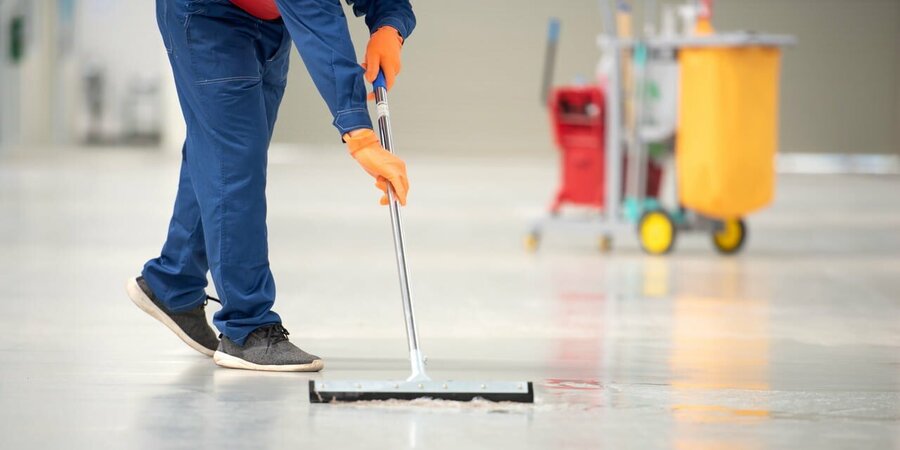Epoxy flooring is a popular choice for residential and commercial spaces due to its durability, longevity, and aesthetic appeal. Whether you have an epoxy floor in your garage, basement, or showroom, proper maintenance is essential to keep it looking its best.
In this article, we will provide valuable tips on cleaning and protecting your epoxy floor to ensure its longevity and preserve its beautiful finish.
Regular Cleaning
One of the fundamental aspects of epoxy floor maintenance is regular cleaning. By removing dirt, debris, and stains promptly, you can prevent them from causing long-term damage to the epoxy surface. Here are some tips for effective cleaning:
- Sweep or Vacuum: Regularly sweep or vacuum the floor to remove loose dirt and debris. This will prevent them from scratching the epoxy surface during foot traffic.
- Mop with Warm Water: Fill a bucket with warm water and mop the floor using a soft microfiber mop. Avoid using abrasive brushes or harsh chemicals, as they can damage the epoxy coating. If necessary, use a mild, pH-neutral cleaner recommended by the flooring manufacturer.
- Spot Cleaning: For stubborn stains, such as oil or grease, use a gentle detergent or a specialized epoxy floor cleaner. Apply the cleaner directly to the stain and gently scrub with a soft-bristle brush. Rinse thoroughly with water afterward.
Prevent Scratches and Abrasions
Although epoxy floors are highly resistant to scratches and abrasions, taking precautions can significantly extend their lifespan. Here are some measures you can take to prevent scratches and abrasions:
- Use Protective Mats: Place mats or rugs at entrances and high-traffic areas to trap dirt and prevent it from scratching the floor. Ensure that the mats have non-slip backing to avoid any accidents.
- Avoid Dragging Heavy Objects: When moving furniture or heavy objects across the floor, lift them instead of dragging them. Use furniture sliders or place a plywood sheet underneath to distribute the weight and minimize the risk of scratching.
- Use Soft Bristle Brooms: When sweeping, choose a broom with soft bristles to avoid scratching the epoxy surface. Avoid using stiff-bristle brooms or brushes that can cause abrasions.
Prevent Chemical Damage
Epoxy floors are generally resistant to chemicals, but prolonged exposure to certain substances can cause damage over time. Here are some steps to prevent chemical damage:
- Clean Spills Immediately: Promptly clean up any spills to prevent the chemicals from penetrating the epoxy coating. Wipe the spill with a soft cloth or paper towel and rinse the area with water.
- Use pH-Neutral Cleaners: When cleaning the floor, always use pH-neutral cleaners recommended by the flooring manufacturer. Avoid using acidic or abrasive cleaners, as they can degrade the epoxy surface.
- Protect from Chemical Exposure: Consider adding chemical-resistant coatings or mats to protect the epoxy floor if you anticipate heavy chemical use in a specific area. This is particularly important in garages or workshops where automotive fluids or harsh chemicals may come into contact with the floor.
Prevent UV Damage
Prolonged exposure to direct sunlight and UV rays can cause epoxy floors to fade or yellow over time. To protect your floor from UV damage:
- Use Window Treatments: Install blinds, curtains, or UV-protective films on windows to reduce the amount of direct sunlight entering the room.
- Apply UV-Resistant Topcoat: Consider applying a UV-resistant topcoat to your epoxy floor. This additional layer of protection helps block harmful UV rays and extends the life of the floor.
Prevent Thermal Shock
Thermal shock occurs when the temperature of an epoxy floor changes rapidly, causing the coating to expand or contract abruptly. To prevent thermal shock:
- Use Rugs or Mats near Heat Sources: Place rugs or mats near heat-emitting appliances like stoves, furnaces, or ovens to provide a buffer between the floor and the heat source.
- Avoid Hot Spills: Avoid spilling hot liquids directly on the floor, as the sudden temperature change can damage the epoxy coating. Use coasters or trivets under hot objects to protect the floor’s surface.
Periodic Maintenance
In addition to regular cleaning, periodic maintenance can help keep your epoxy floor in top shape. Consider the following:
- Recoating: Over time, the epoxy coating may wear down. Periodically recoating the floor can revive its appearance and provide an extra layer of protection. Consult the flooring manufacturer for recommendations on recoating intervals.
- Professional Maintenance: For larger commercial spaces or heavily trafficked areas, it may be beneficial to hire professional maintenance services. Professionals have the knowledge, tools, and expertise to perform deep cleaning, repairs, and maintenance tasks to ensure your epoxy floor stays in optimal condition.
By following these epoxy flooring maintenance tips, you can ensure that your floor retains its beauty and durability for years to come. Regular cleaning, preventing scratches and abrasions, avoiding chemical damage, protecting against UV rays, preventing thermal shock, and periodic maintenance are all crucial to maintaining an epoxy floor’s pristine appearance. With proper care, your epoxy floor will continue to impress visitors and provide a reliable, attractive surface for your home or business.
Key Takeaways:
- Regular cleaning is essential to maintain the appearance of epoxy flooring. Sweep or vacuum regularly and mop with warm water using a soft microfiber mop.
- Take precautions to prevent scratches and abrasions. Use protective mats, avoid dragging heavy objects, and use soft bristle brooms for sweeping.
- Prevent chemical damage by cleaning spills immediately, using pH-neutral cleaners, and considering additional protective coatings or mats in areas with heavy chemical use.
- Protect your epoxy floor from UV damage by using window treatments and applying a UV-resistant topcoat.
- Avoid thermal shock by using rugs or mats near heat sources and preventing hot spills directly on the floor.
- Periodic maintenance, such as recoating, can help prolong the life of your epoxy floor.

